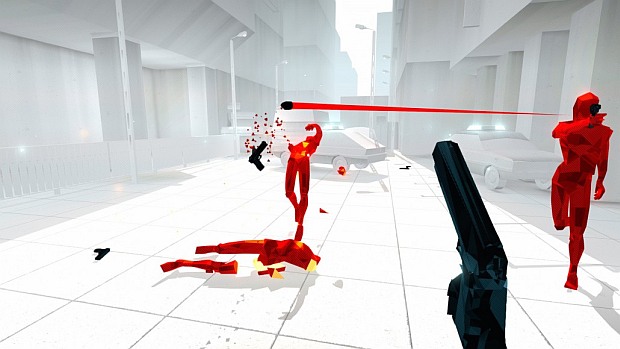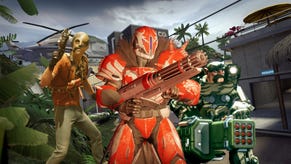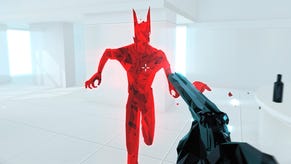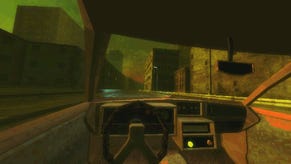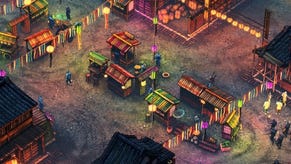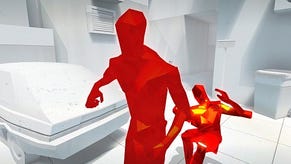Superhot Is The FPS Made Cool Again
Time moves when you do.
Superhot [official site] is the first-person shooter deconstructed. You don't move and shoot, jump and dodge. You move then shoot, jump then dodge. The reason for your turn-based decision making is that time only moves when you do. I've been playing the beta for the past week, and it's superb.
The beta is available to Kickstarter backers who last year funded the game to the tune of $250,000, largely on the strength of a freely released prototype made the year before for the 7-Day FPS jam. The money is visible on screen; where the original was sparse by necessity, the full-game makes an art of its pristine white environments and its shimmering red enemies which shatter like glass when struck.
It's also naturally expanded in scope from those few levels. There's a story mode which drops you into disconnected combat vignettes, in bars and factories and back alleys, each one requiring a little extra thought from you if you're to dodge the obstacles and survive intact. There's a meta-narrative that strings this all together, which I won't spoil, but which begins with the game's command line-style interface and carries through the now trademark onscreen text flashes. There's also an endless mode, in which you're challenged to survive respawning waves of red enemies, with or without a selection of GoldenEye or Unreal Tournament-style modifiers.
The story mode is good, and I look forward to playing more of it when the game is finished, but it's this endless mode that I keep returning to and where the game most shines. By changing the way time flows and increasing the focus on individual actions, Superhot takes on a rhythm that's familiar from its real-time peers - and propulsive, ultra-violent fare like Hotline Miami - but with thoughtfulness in place of reflex.
You learn how to move through its levels like learning the steps of a dance. Step one: leap upon the table. Step two: leap again, over the now approaching bullet, and land upon the enemy to kill them. Step three: turn around, and grab their gun as it sails through the air. Step four: turn right and position the crosshairs just in front of the thinnest sliver of red arm approaching through a doorway. Step five: fire, but don't bother waiting to see the bullet hit.
By breaking each moment down into single actions, you're able to carry out actions with precision and coolness that would be impossible in real-time. At the end - which in endless mode, is when you die - you're rewarded with a real-time replay that shows your dance as if it was a single action. All of the practice that got you there disappears in the final performance. This isn't an uncommon reward for games of trial and error - the same trick hooked me in N, and in Trackmania - but Superhot is different in that you feel clever even before time is sped up.
It feels slick to grab a gun out of mid-air, even when there's no skill involved in doing so. It feels skillful to launch a sword through the air at where you think an enemy is about to appear and to hit. It feels cool not to look at that hit, relying instead on the full-screen number momentarily flashing up your kill count: "16". It feels balletic, John Woo-style, to toss a gun in someone's face to send them reeling so you can steal their dropped baseball bat and smash them into pieces.
Endless mode becomes quickly difficult and I think my best score is 26, but the game supports you in feeling great. The kill counter, which means you don't need to look at the explosion of red glass, is one example. The slow rotation of your crosshair and its slight pulse upon reload is another, as is the limited ammo contained within each gun that forces you to throw it away and keep moving.
Mostly though it's that time isn't dealt out, as it likely would be in a proper turn-based game, in fixed increments. Time moves when you turn your head. Time moves when you take a step, with a single step obviously taking a little longer than the smallest increment of head movement. Time moves when you fire a gun, with more time passing as you fire a machinegun - in four bullet increments - than when firing a single projectile from a handgun.
The result is that you're constantly making decisions. A bullet will be sailing towards you, but you won't fire back because you know that the time progression will be great enough that you'll be killed. Instead you sidestep, winding the bullet past you as you wind yourself out of its path. Or, as per the GIF below, you'll find yourself with no sidesteps to make and wonder whether jumping will use too much time and see you defeated.
[This should snap to the right size; if it doesn't, click through for an unzoomed version.]
Phew. In this sense, time takes on a relationship with space. You judge distances in terms of how long it will take you or the bullets to travel them.
Time seeps into every corner of Superhot, then. It is a game about time. It's also a game about the building blocks of every first-person shooter, taken apart and made cool again.
Superhot is due for general release later this year. You can still play the 2013 prototype.




